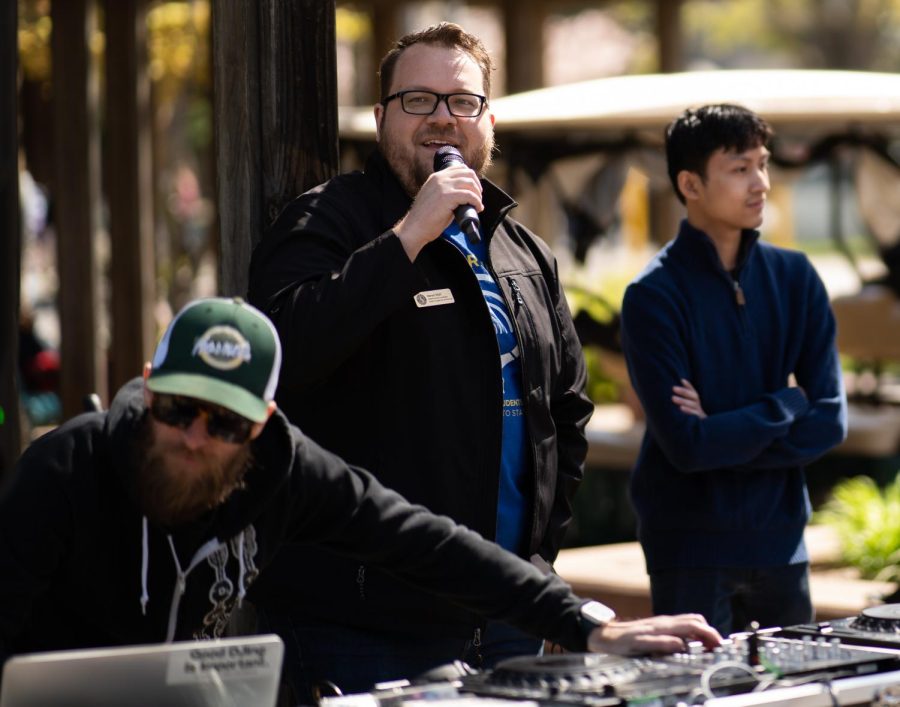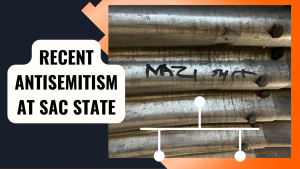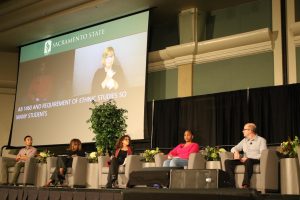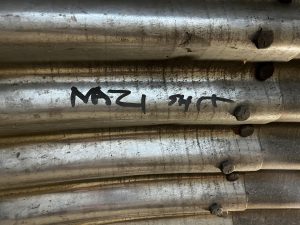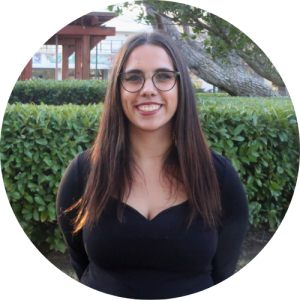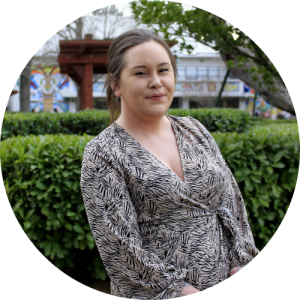Students recording podcast with KSSU say station advisor performed Nazi salute
Gesture reportedly made during unaired episode on antisemitism
ASI Student Services Coordinator for KSSU Aaron Wall (middle) holding a microphone at an event in the Library Quad Monday, March 27, 2023. Wall is accused of making a Nazi salute during the recording of a podcast at KSSU.
April 6, 2023
Editors note: This story prompted a video response from President Robert Nelsen and Associated Students, Inc. President Salma Pacheco on April 7. Read about it here.
Three Sacramento State Art History Club members were recording a podcast in KSSU’s sound room when, they said, the station advisor made a gesture that made them uncomfortable and caused them to use the university’s Acts of Bias Reporting Tool.
On Feb. 24, third-year studio art and art painting major Anya Thompson was joined by two co-hosts and the station’s advisor and ASI Student Services Coordinator for KSSU, Aaron Wall, to record an episode about topics including blood libel.
Wall was assigned to the project as the student’s sound engineer and was working on audio when Thompson, who is Jewish, was talking with a co-host about World War II and said she wanted to avoid mentioning Adolf Hitler’s name to avoid making the episode focused on him and prompting an opportunity to make a joke.
“I mean, [he was] just a dude with a mustache,” Thompson said in the podcast.
As Thompson finished her sentence, she said Wall was standing over her, with his hand in the air doing a Nazi salute.
The room became uncomfortably silent, followed by an awkward laugh the co-host explained was out of discomfort and “absurdity of the situation,” adding she couldn’t believe Wall made a salute minutes after they recorded a content warning for the podcast.
“Sorry, my bad. I shouldn’t have done that,” Wall said, as heard in the audio.
Co-host and art history major Madeline Madrid said the situation was uncomfortable, as Wall was aware of Thompson being Jewish.
“It was in a very tiny room,” Madrid said. “It felt like a hostage situation.”
Thompson said she was launched into an emotional whirlwind because of the incident. She said she felt depressed after Wall’s actions and that she and her peers initially trusted him, adding that they started on a “good vibe.”
“That trust had been violated [after he saluted],” Madrid said. “Because then he would think it would be okay to joke in that sort of matter.”
Thompson said, as a result of the incident, her academics began to suffer and she took a week off of work because of how much the situation distracted her. She said she avoided going into the University Union, where KSSU is located, to avoid interactions with Wall.
RELATED: Sac State, ASI presidents issue apology regarding antisemitic incident at KSSU
Mya Dosch, an assistant professor of art, was alerted to the incident by Thompson and her two other co-hosts.
As the adviser of the students’ art history club, which launched the podcast project, Dosch said hearing the incident made her fearful of sending her students off to KSSU — a space she thought would be safe.
“[My students] came back with having this incident of hate speech happen in that space,” Dosch said. “That really makes me worried about what our campus represents and how students feel in terms of their basic safety.”
Dean of Arts and Letters, Sheree Meyer, said she was appalled after learning about the incident.
Meyer, who is also Jewish, said after hearing about the incident and learning that Wall made the gesture — from what she understands — knowing Thompson is Jewish, was a “kick in the gut.”
“To know that someone thought it was funny, or whatever — I don’t know what the motivation was — to do a Heil Hitler salute is traumatizing,” Meyer said. “I don’t use that word loosely, but again, if you think about cultural trauma, it’s similar in some ways to other triggers to some of us who are Jewish.”
Meyer said she met with Mia Settles-Tidwell, vice president for Inclusive Excellence, and was “assured” the university is taking antisemitism seriously.
Madrid filed a complaint with the university’s reporting process. In filing the form, Thompson and Madrid said there was no option to select discrimination against a religious group.
Meyer said she and Settles-Tidwell discussed the concerns the students expressed about the form of the bias report.
“Like any process or policy or form, I think it’s open to revision,” Meyer said.
After months have passed since reporting the incident to the Division of Inclusive Excellence, Thompson and Madrid said there has been no resolution after several meetings and email exchanges between them and a representative handling the case.
Both students said they requested a new sound engineer, and in response to their request, a specialist associated with the Bias Reporting Tool told them that option was “unrealistic.”
Almost a month after the incident, Thompson and Madrid were told by their representative, who later left Sac State, that Human Resources could not give them a replacement.
“It’s just been roadblock, after roadblock, after roadblock, and it’s all been victim responsibility to do anything on it,” Thompson said. “When there’s actually something happening on campus that [the university] needs to know about, we get stuck through institutional roadblocks.”
Wall said he had no comment about the matter but that he is “cooperating with the Division of Inclusive Excellence on their restorative justice process.”


























































































































